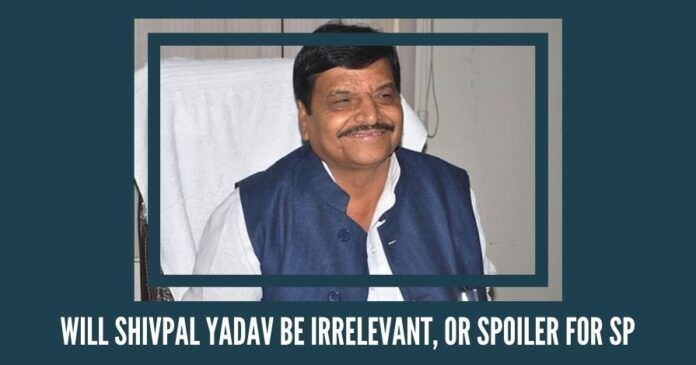
It’s possible that new venture of Shivpal Yadav may fit the recent historical pattern. But for now, it has given a new twist to the battle in Uttar Pradesh.
The forthcoming Assembly elections to five States has occupied the attention of the Bharatiya Janata Party, the Congress and various others for a variety of reasons. If there is one politician who couldn’t possibly be bothered less, it is Shivpal Yadav. Younger brother of the veteran Mulayam Singh Yadav; one-time heavyweight leader of the Samajwadi Party; now head of a new outfit, the Samajwadi Secular Morcha (SSM); and burning with a desire for revenge against his nephew Akhilesh Yadav who sidelined and humiliated him to an extent that Shivpal had no choice but to exit the party he had helped his elder brother establish and build from scratch. For Shivpal Yadav, the real battle will be in 2019, when he will seek to dent the Samajwadi Party’s prospects in the Lok Sabha seats from Uttar Pradesh.
Mulayam Singh Yadav himself, despite having been sidelined in a party that he founded, has not openly rebelled against the new leadership of his son Akhilesh Yadav.
He has begun the groundwork, particularly eyeing seats that have in recent years been the Yadav family’s stronghold — Etawah, Mainpuri, Firozabad, Etah, Farrukhabad, Badayun, and Kannauj. The process to select candidates is already on. These are regions where Shivpal Yadav had worked on the ground in his days of glory, establishing the Samajwadi Party’s strong presence. Ironically, his rival today, Akhilesh Yadav, is hoping to benefit from the efforts he had made. Shivpal Yadav himself is expected to throw his hat into the ring from one of these constituencies. A little-known organization, the Shri Krishna Vahini, is likely to back Shivpal Yadav’s new party.
Although it is unlikely that he will tie up with the BJP, given communal considerations, there is no doubt that his chief target will be the Samajwadi Party, and he will be quite happy to steal enough votes from his former party to ensure its defeat — even if that benefits the BJP. Besides, Shivpal Yadav enjoys the rapport with the local BJP leadership, including Chief Minister Yogi Adityanath, whose regime recently allotted his new outfit a bungalow vacated by the Bahujan Samaj Party.
Political pundits who have been observing the fluid situation in Uttar Pradesh, believe that Shivpal Yadav has the ability to inflict damage to the Akhilesh-led Samajwadi Party, though they also hold that the SSM is unlikely to emerge as a major political force in the State, at least over the next six months. Shivpal Yadav faces many daunting challenges. The first is that regardless of his grassroots connect, most supporters of the Samajwadi Party have accepted Akhilesh Yadav as their new leader and successor to Mulayam Singh Yadav. The second is that the Samajwadi Party this time around will approach the election from a position of added strength as a consequence of its alliance with the BSP. And the third is that Mulayam Singh Yadav himself, despite having been sidelined in a party that he founded, has not openly rebelled against the new leadership of his son Akhilesh Yadav. Indeed, off and on he has appeared to endorse Akhilesh, much to the annoyance of Shivpal Yadav. In fact, one of the reasons why Shivpal Yadav delayed the formation of his new party was because he was hoping and waiting for his elder brother to categorically support him. But when that did not happen, and Shivpal had burned his bridges with Akhilesh Yadav, the split formally took place.
Regional outfits have not done well in Uttar Pradesh since the advent of the BSP and the Samajwadi Party.
Akhilesh Yadav had established his primacy in the run-up to the 2017 Assembly election, taking charge of the party by gently ousting his father and then determining the course of the poll campaign by aligning with the Congress. Both Mulayam and Shivpal were left sulking, but they decided to bide their time, hoping that a poor show by the party would help them seize the leadership. The Samajwadi Party did fare poorly, but Shivpal’s expectation did not materialize. The Samajwadi Party remained firmly in Akhilesh Yadav’s grip, Mulayam Singh Yadav lost steam, and Shivpal Yadav became a has-been. Had the brothers precipitated matters prior to the Assembly poll, they would have been more strongly placed today.
Regional outfits have not done well in Uttar Pradesh since the advent of the BSP and the Samajwadi Party. Former Samajwadi Party leader Amar Singh had tried to gain a toehold when he floated the Lok Manch ahead of the 2012 Assembly election. All his candidates had lost their deposits, and the Manch sunk unceremoniously. Apna Dal (Sonelal), now helmed by Union Minister Anupriya Patel, too had almost gone into oblivion before bouncing back after it aligned with the BJP in the 2014 Lok Sabha poll. In the years soon after its formation, Apna Dal candidates had found it difficult to register victories even in constituencies which had a large population of the Patel (Kurmi) caste. It’s possible that Shivpal Yadav’s new venture may fit the recent historical pattern. But for now, his party has given a new twist to the battle in Uttar Pradesh.
Note:
1. The views expressed here are those of the author and do not necessarily represent or reflect the views of PGurus.











Coming from a poor family as they do, how do the family, though divided, start parties whenever they chose?
As regards the question raised, he is just surveying the market now with the “tender” having just been floated by way of his nascent party–the tenders will be opened and the H1 will be selected!
I hope, you get the meaning.